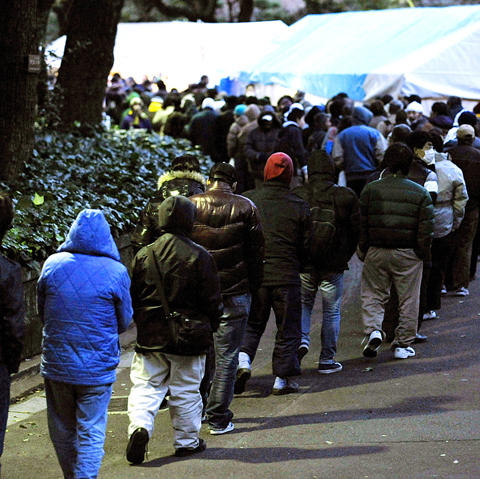A tent village set up in a Tokyo park for the country’s growing number of jobless filled up so fast that it was moved yesterday to a government building to accommodate the overflow.
The government offered a ministry hall late on Friday, responding to a request from volunteers, to house more than 250 unemployed and homeless people after the first comers quickly filled the tents, according to the shelter’s Japanese-language Web site.
The homeless can stay in the building through tomorrow and job counseling and other efforts are under way to place the people in other locations, it said.

PHOTO: AP
The tent village that volunteers and unions opened on New Year’s Eve highlights the serious social costs of the global recession for the world’s second largest economy.
The government estimates 85,000 part-time workers will lose their jobs between October and March. Another 3,300 permanent employees are expected to become jobless over the same period.
Temporary workers have been the first to be fired in the latest wave of cutbacks as Japan’s exports and company investments crashed after the US financial crisis.
Temporary jobs at manufacturing were illegal before 2004, but today top companies, including Toyota Motor Corp and Canon Inc, routinely rely on temporary staffing to adjust production to gyrating overseas demand.
Japanese Communist Party executive committee chair Kazuo Shii, who visited the village, said the government needs to do more to help the unemployed.
“It is unforgivable that Japan’s major companies have thrown so many workers out on the streets at the end of the year,” he said.
For decades Japan promised lifetime jobs at major companies and government welfare programs for the jobless are still limited.
The village has also drawn some who have been needy for years.
Shigeru Kobayashi, 65, who has been unemployed four years, lives in the park.
“People talked about a recovery, but it never got good anyway,” he said with a grin. “I’m unemployed. All I have is heart.”
Tamotsu Chiba, 55, a theater producer and volunteer at the tent village, said he found the energy of the volunteers encouraging.
“There are so many kinds of people here. This has given me a feeling of hope about Japan,” he said.

Intel Corp chief executive officer Lip-Bu Tan (陳立武) is expected to meet with Taiwanese suppliers next month in conjunction with the opening of the Computex Taipei trade show, supply chain sources said on Monday. The visit, the first for Tan to Taiwan since assuming his new post last month, would be aimed at enhancing Intel’s ties with suppliers in Taiwan as he attempts to help turn around the struggling US chipmaker, the sources said. Tan is to hold a banquet to celebrate Intel’s 40-year presence in Taiwan before Computex opens on May 20 and invite dozens of Taiwanese suppliers to exchange views

Application-specific integrated circuit designer Faraday Technology Corp (智原) yesterday said that although revenue this quarter would decline 30 percent from last quarter, it retained its full-year forecast of revenue growth of 100 percent. The company attributed the quarterly drop to a slowdown in customers’ production of chips using Faraday’s advanced packaging technology. The company is still confident about its revenue growth this year, given its strong “design-win” — or the projects it won to help customers design their chips, Faraday president Steve Wang (王國雍) told an online earnings conference. “The design-win this year is better than we expected. We believe we will win

Chizuko Kimura has become the first female sushi chef in the world to win a Michelin star, fulfilling a promise she made to her dying husband to continue his legacy. The 54-year-old Japanese chef regained the Michelin star her late husband, Shunei Kimura, won three years ago for their Sushi Shunei restaurant in Paris. For Shunei Kimura, the star was a dream come true. However, the joy was short-lived. He died from cancer just three months later in June 2022. He was 65. The following year, the restaurant in the heart of Montmartre lost its star rating. Chizuko Kimura insisted that the new star is still down

While China’s leaders use their economic and political might to fight US President Donald Trump’s trade war “to the end,” its army of social media soldiers are embarking on a more humorous campaign online. Trump’s tariff blitz has seen Washington and Beijing impose eye-watering duties on imports from the other, fanning a standoff between the economic superpowers that has sparked global recession fears and sent markets into a tailspin. Trump says his policy is a response to years of being “ripped off” by other countries and aims to bring manufacturing to the US, forcing companies to employ US workers. However, China’s online warriors